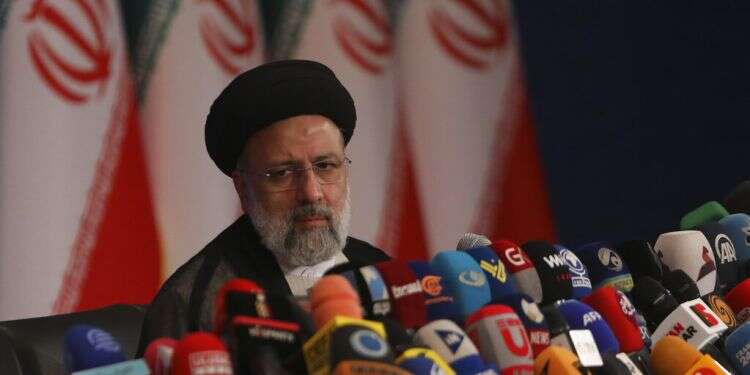Iran's president-elect said Monday he wouldn't meet with US President Joe Biden nor negotiate over Tehran's ballistic missile program and its support of regional militias, sticking to a hard-line position following his landslide victory in last week's election.
Follow Israel Hayom on Facebook and Twitter
Holding his first news conference since winning Friday's election, Ebrahim Raisi, 60, a hardliner and strident critic of the West, said Iran's foreign policy will not be limited by its 2015 nuclear agreement with world powers.
"We will have interaction with the world. We will not tie the Iranian people's interests to the nuclear deal," he asserted.
The judiciary chief, who described himself as a "defender of human rights" despite his known involvement in the 1988 mass execution of some 5,000 people, made the comments in his first press conference in Tehran.
"The US is obliged to lift all oppressive sanctions against Iran," he said.
He said his government's priority would be improving regional ties and called on Saudi Arabia to immediately halt interfering in Yemen.
"Saudi Arabia and its allies should immediately stop their interference in Yemen," he said, adding that "Iran wants interaction with the world ... my government's priority will be improving ties with our neighbours in the region."
The victory of Raisi, the protege of Iran's supreme leader sanctioned by the US in part over his involvement in the mass executions, came amid the lowest turnout in the Islamic Republic's history. Millions of Iranians stayed home in defiance of a vote they saw as tipped in Raisi's favor.
Of those who did vote, 3.7 million people either accidentally or intentionally voided their ballots, far beyond the amount seen in previous elections and suggesting some wanted none of the four candidates. In official results, Raisi won 17.9 million votes overall, nearly 62% of the total 28.9 million cast.
Raisi's election puts hard-liners firmly in control across the government as negotiations in Vienna continue to try to save a tattered deal meant to limit Iran's nuclear program, at a time when Tehran is enriching uranium at 60% its highest levels ever, though still short of weapons-grade levels. Representatives of the world powers party to the deal returned to their capitals for consultations following the latest round of negotiations on Sunday.
Subscribe to Israel Hayom's daily newsletter and never miss our top stories!




